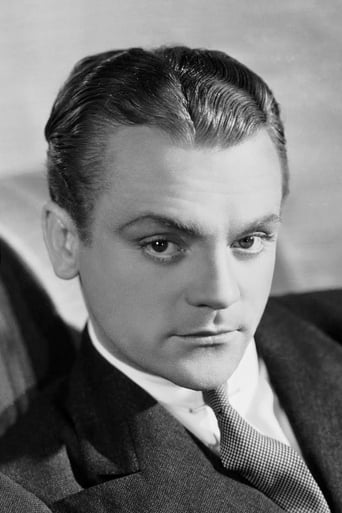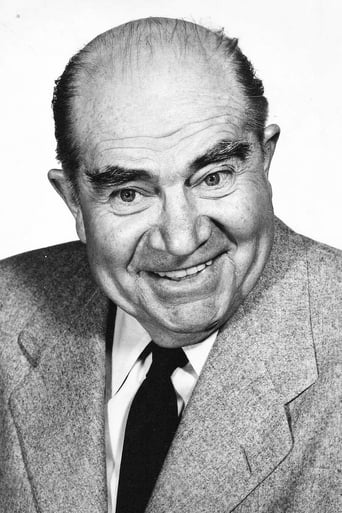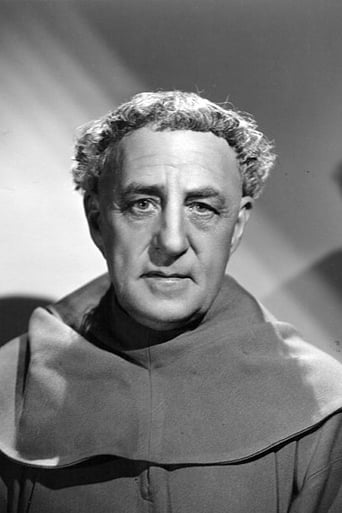Dynamixor
The performances transcend the film's tropes, grounding it in characters that feel more complete than this subgenre often produces.
AshUnow
This is a small, humorous movie in some ways, but it has a huge heart. What a nice experience.
Abbigail Bush
what a terribly boring film. I'm sorry but this is absolutely not deserving of best picture and will be forgotten quickly. Entertaining and engaging cinema? No. Nothing performances with flat faces and mistaking silence for subtlety.
dougdoepke
Unusual Cagney entry. He's promoted to head of city Weights and Measures after the former head is roughed up by corrupt city government. Now I've seen a ton of old movies, but this is the first to deal W and M. Still, there's a lot of material for a crime movie. After all, that bureau is supposed to make sure consumers get what they pay for. The movie's first part deals with the various scams retailers could use then (1930's) to cheat customers. Cagney's Johnny Cave proves a zealously honest enforcer, bringing him into conflict with the mayor and other higher-ups. Their points of conflict form most of the narrative.At this point in his career, Cagney had left Warner Bros. to free lance. In terms of prestige, the production outfit (Zion Meyers) appears a come-down for the actor. But you'd never know it. He's a one-man show, happily supported by a colorful cast of mugs and icy politicos. Plus, Mae (grapefruit in the face) Clarke teams up again, this time as an eye-catching brunette. Then too, I like the interspersed colorful touches, like the fat guy in the cafeteria line who keeps hi-jacking Cave's food. Or Cave's digs at Janet's (Clarke) lumpy hat. Watch quickly for handsome leading-man-to-be Robert Lowery as one of the ballroom dancers. My only gripe is the fist-fight that's both exaggerated and unnecessary to the plot. I suspect that was to work in a big action scene.All in all, it's a lesser known Cagney feature from the 30's. But the tough guy's still in fine Cagney form. At the same time, the script's concern with consumer protection from scheming merchants and politicos seems almost contemporary. Technology may have changed, but some things don't.
classicsoncall
Five years after she teamed up with James Cagney in "The Public Enemy", Mae Clarke makes another appearance, this time as his fiancée with Cagney's character on the other side of the law. It seems like she was calling more of the shots in their relationship as well, trying to get Johnny Cave to be a little more practical with his money and his career. You had to figure they'd get back together after she gave him the boot for challenging her crooked boss; those things have a way of working out in pictures.I got a kick out of watching Cagney in this one. I usually do, and here he looked like he might have auditioned that characteristic shoulder shrug move that he used to good effect in "Angels With Dirty Faces" portraying Rocky Sullivan. It was right after he threw Cavanaugh (Robert Gleckler) out of his office during the first attempt at bribing the new Weights and Measures boss. He turns to the camera and hitches up as if entirely pleased with his response to the crook - very cool.It's my understanding that this wasn't one of Cagney's Warner films, but it might as well have been. Warner's often took up the cause for the common man, and the expose of crooked merchants and the politicians who protected them would have been right up their alley. You also have those great New York City street scenes depicting cars and shops of the era, with home made signs pricing flour at eighteen cents a pound. Hey, how about the furniture store selling the living room set for a hundred eighty nine dollars, you might get a single stick chair for that price today.Best part of the picture just might be that meat counter scene when Cagney, James Burke (Aloysius) and the butchers play catch with an underweight chicken. One of the film's lighter moments, but you get an idea how tense people can get when they're caught cheating. Same with the truck driver who's pressured by Johnny into signing for an accurate delivery; he just wasn't used to doing that.All in all, a nice diversion from Cagney's more typical gangster presence, even if not up to the standard of his feature films. It's easy enough to obtain as one of a handful of public domain Cagney pictures out there, and often found in relatively inexpensive compilations.
lugonian
GREAT GUY (Grand National, 1936), directed by John G. Blystone, is an interesting yet plausible low budget production starring none-other than James Cagney, the same James Cagney of the higher quality studio of Warner Brothers. What's a top actor like James Cagney doing over at Grand National instead of at the majors as MGM, Columbia, United Artists or even Paramount? Well, it had something to do with a contract dispute, which kept him away from his home lot for nearly two years. Since Grand National, not First National, initially began in early 1936, how fortunate for the studio to have acquired a top name like Cagney working for them? How unfortunate for the studio to have lost his services following his second with the studio, a musical titled SOMETHING TO SING ABOUT (1937). How fortunate to have Cagney return to his home studio where he truly belonged, and continue to work on films that were to become classics. As for those done at Grand National .... well, let's take a look at his initial offering of THE GREAT GUY. It's not a gangster film idolizing a popular crime boss but actually a crime story placing Cagney on the right side of the law attempting to rid corruption. Having done something similar the year before in G-MEN, the misfortune for GREAT GUY is not having much gun play nor fast-pace action to make this equivalent to a Warner Brothers production.The story opens with Joel Green (Wallis Clark), chief deputy of the Bureau of Weights and Measures, injured in a car crash, now in a hospital. Knowing the accident was a set up, Green calls for his friend, Johnny Cave (James Cagney), a former prizefighter working with the department of Weights and Measures, and assigns him in his place to acquire enough evidence on the corrupt district leader Marty Cavanaugh (Robert Gleckler). With the assistance of fellow Irishman Pat Haley, whom he calls Aloyisus (James Burke), Johnny teaches him the tricks of the trade of chiselers at the Paradise Market defrauding shoppers by exposing eights on chickens, putting false bottoms in baskets of strawberries, and cheating drivers of their gallons of gas. As for his love life, Johnny is engaged to Janet Henry (Mae Clarke), secretary to city official Abel Canning (Henry Kolker). Janet loves Johnny but finds him too conceited and quick tempered, but overall honest. Refusing to accept bribes even from the city Mayor (Douglas Wood), Johnny later has his work cut out for him by being abducted by hired thugs who frame him on a drunk and driving charge unless he gives up his investigation to expose the gang leader responsible for corruption.The supporting cast includes Edward Brophy (Pete Reilly); Bernadene Hayes (Hazel Scott); and Edward McNamara as Captain Pat Hanlon, whose great scene has him standing outside the door smoking his cigar while his pal Johnny takes care of the ring leader. The big surprise in GREAT GUY is the casting of James Burke, better known for playing cops, playing the dopey sidekick in the El Brendel tradition, sporting an Irish derelict compared to Brendel's Swedish one. This was one of the few opportunities seeing Burke in a sizable part typically suited for the likes of an Allen Jenkins or Frank McHugh.With all the ingredients of a Warner Brothers programmer, down to Joseph Sawyer (a Warners stock player) as one of the mobsters, what GREAT GUY lacks is polish and production values. Overall, GREAT GUY turns out to be a reunion of sorts between Cagney and Mae Clarke, his grapefruit victim from THE PUBLIC ENEMY (1931), and co-star of LADY KILLER (1933) the one where he dragged her across the room by the hair. This time they are on friendly terms, as an engaged couple who gather together for lunch in a cafeteria and, with a touch of humor, talking things over at a furniture store with a salesman (Arthur Hoyt) trying to interest them with the display.Virtually unknown even by film buffs, GREAT GUY is one film in Cagney's filmography list that doesn't get a mention in his 1977 autobiography, "Cagney by Cagney," though his second Grand National starer did. Not until the age of video recording of the 1980s or late in the 1970s on commercial television has GREAT GUY been given some exposure. Circulating prints from 1980 and over suffer from being ten minutes shorter than its actual 75 minute release. Abrupt cuts are noticeable, especially one scene involving Mary Gordon as Mrs. Ogilvie and the corruption involving milk deliveries at the orphanage, found in current video, DVD and public TV late show broadcasts. While a complete version with clearer picture quality won't change GREAT GUY from its low-budget status in the Monogram Studios tradition to a Class "A" Warners production, but restoration will make a big difference on how to view this one, especially with the great guy himself, James Cagney. (***)
Hitchcoc
It's fun to watch a young James Cagney doing his thing. He plays the cheapskate Weights and Measures guy who takes his job very seriously, stepping on the toes of a group of crooked politicians. He is offered the world, but keeps his integrity. He is beaten and set up, but that's the problem. We never know if he is really in danger. They say he's in a spot, but still seems to have carte blanche to move around and do what he needs to do. At times he's so cocky he doesn't do much to protect himself. His allies are in the police department but just about everything else is pretty corrupt. He perseveres (almost too good to be true), of course, and we pull for him. The problem for me is a lack of sustained suspense. It would have been much better if he had had to clear his name. He never drops into the depths, even when rejected by his wife to be. It's still fun with the bad guys kind of imploding. See it just to watch Cagney do his tough guy posturing.





